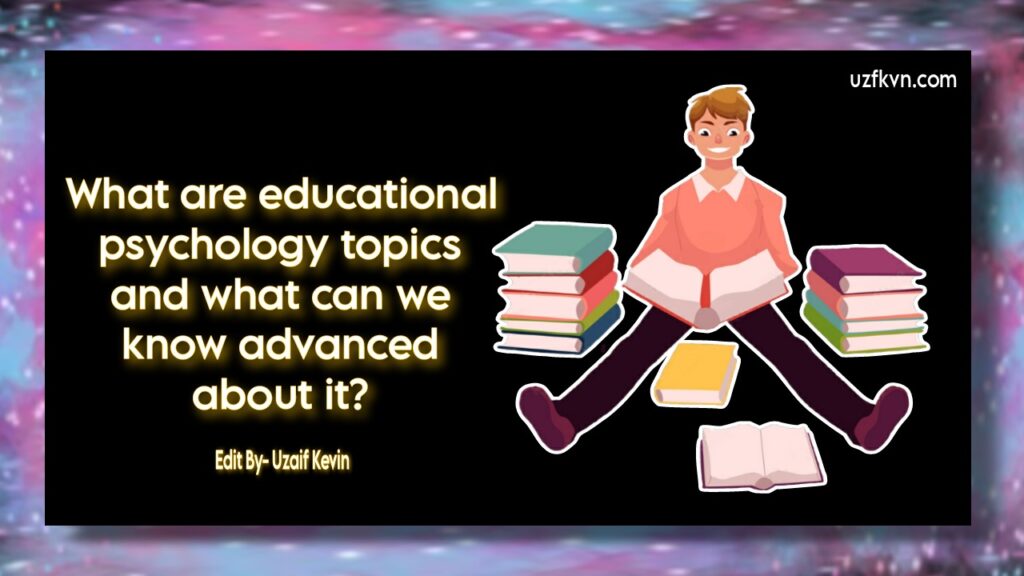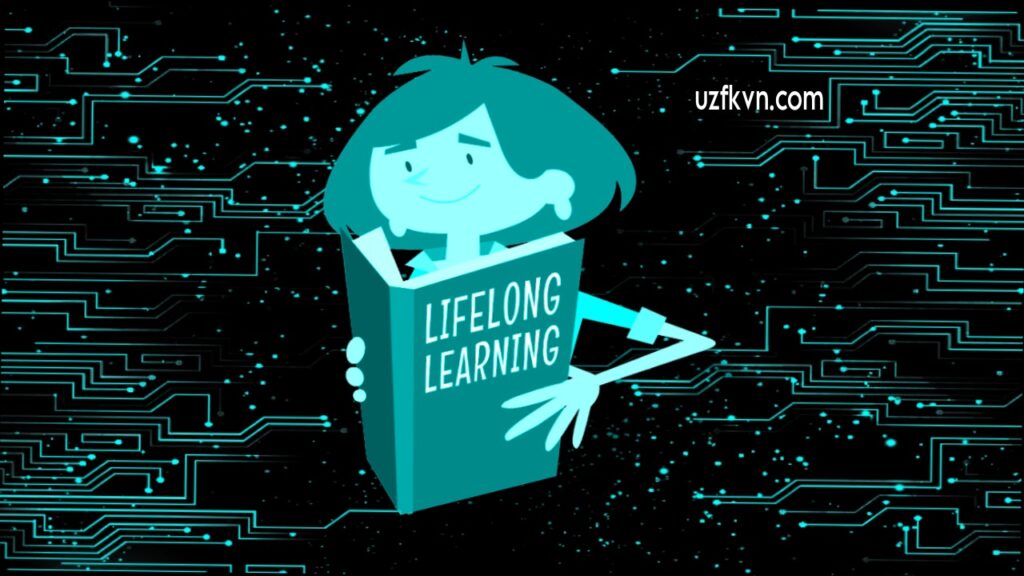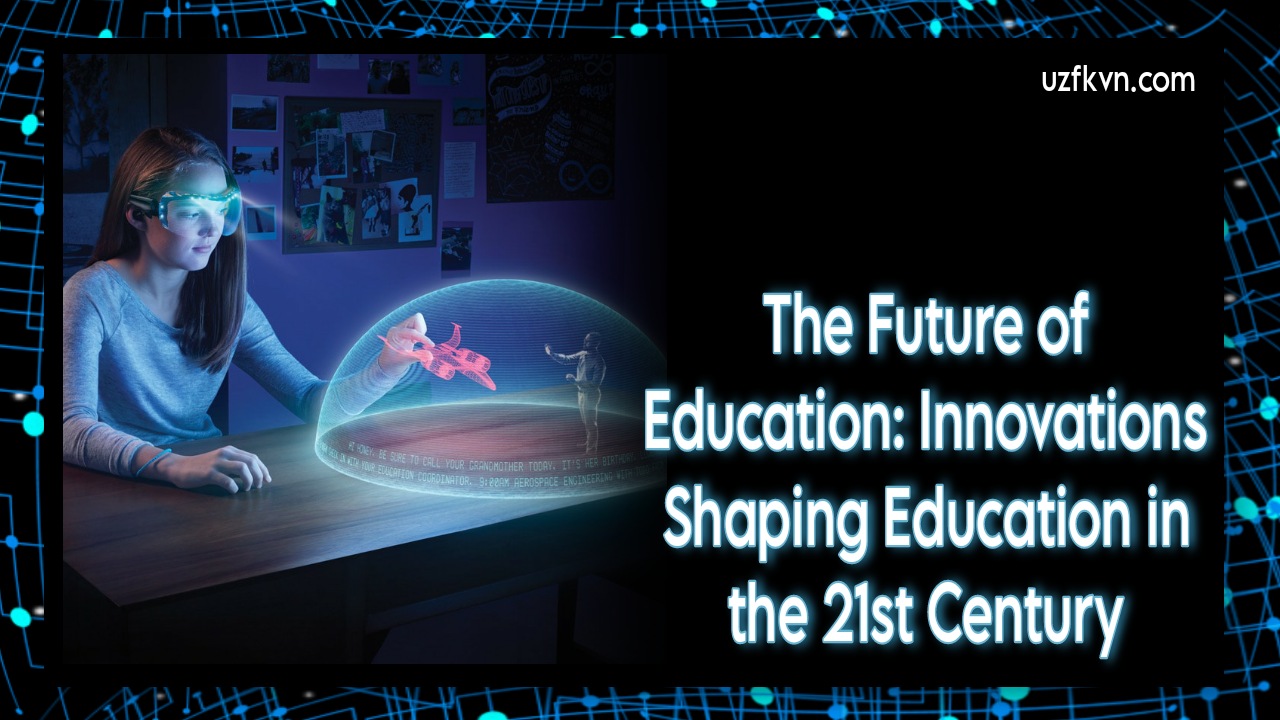The Future of Education: Innovations Shaping Education
Education has always been a fundamental aspect of human development and progress. For centuries, didactics, the science and art of teaching, has evolved to meet the changing needs of learners and society. As we move into the 21st century, rapid technological advancements, changing societal dynamics, and the growing demand for relevant and accessible the future of education are reshaping the landscape of didactics.
Hello friends, I am Uzaif Kevin the author of your own website uzfkvn.com I hope you all are absolutely fine. I’m fine too. So without wasting time, In this article, we will explore “The future of education and how innovations are shaping education in the 21st century”
Soo Lets Begin,
Technology-Enabled Learning
Technology has revolutionized nearly every aspect of our lives, and education is no exception. In the future of education, technology will continue to play a pivotal role in shaping how education is delivered and accessed. Online learning, e-learning platforms, virtual classrooms, and digital resources have become integral components of modern education.
One of the key innovations in technology-enabled learning is personalized learning. Personalized learning uses data and analytics to tailor education to the individual needs, learning style, and pace of each learner. Adaptive learning platforms and artificial intelligence (AI)-driven algorithms can analyze a student’s learning patterns, strengths, and weaknesses, and provide customized content and feedback, enhancing the learning experience.

Virtual and augmented reality (VR/AR) are also transforming education. VR can create immersive learning experiences, allowing students to explore distant places, simulate real-world scenarios, and manipulate objects in three-dimensional space. AR can overlay digital content on the physical world, enhancing the learning environment and making abstract concepts more tangible.
Another technological innovation that is shaping the future of didactics is the use of big data and learning analytics. These technologies can collect and analyze vast amounts of data on student performance, engagement, and behavior to identify patterns, trends, and areas for improvement. Educators can use this information to make data-driven decisions, optimize curriculum and instructional strategies, and provide targeted interventions to students who may be struggling.

Flexible and Lifelong Learning
In the future of education, traditional notions of education as a linear process that occurs during a certain period of life will likely be challenged. The concept of lifelong learning, where individuals continually acquire new knowledge and skills throughout their lives, will become increasingly important. As the nature of work changes and the demand for upskilling and reskilling grows, learners will need to adapt and learn continuously to remain relevant in the job market.
Flexible learning models that accommodate the diverse needs and circumstances of learners will also gain prominence. Online and blended learning, which combine digital and traditional learning methods, offer flexibility in terms of time, pace, and location. Learners can access educational resources and engage in learning activities at their own convenience, allowing them to balance their education with other responsibilities such as work, family, and personal interests.
Microlearning, which involves delivering learning content in short, focused bursts, will also become more prevalent. Microlearning allows learners to acquire small chunks of information quickly, making it easier to retain and apply knowledge. Mobile learning, through smartphones and other mobile devices, will enable learners to access learning content on-the-go, anytime, and anywhere.
Competency-Based Education
Competency-based education (CBE) is an innovative approach to teaching and learning that focuses on students mastering specific knowledge, skills, and abilities rather than simply progressing through a set curriculum. In a competency-based model, learners advance based on their ability to demonstrate mastery of predefined competencies, which are aligned with real-world skills and job requirements.
CBE allows learners to progress at their own pace, providing flexibility and customization. Learners can focus on areas where they need more support or challenge themselves to move ahead faster if they already have prior knowledge or experience. CBE also promotes active engagement and critical thinking, as learners are required to apply
their knowledge and skills in real-world scenarios to demonstrate mastery.
In the future of education, competency-based education is expected to gain traction as employers increasingly prioritize skills over credentials. Traditional degrees and certifications may no longer be the sole measure of a person’s qualifications, and CBE can provide a more granular and relevant assessment of an individual’s capabilities. CBE can also bridge the gap between education and the job market by aligning the curriculum with the skills and competencies needed in the workforce. This can help learners better prepare for the demands of the job market and increase their employability.
CBE can be particularly beneficial for learners in underserved communities or those with diverse learning needs. By allowing learners to progress at their own pace, CBE can provide more equitable opportunities for individuals who may require additional support or have different learning styles. CBE can also recognize and value prior learning and experiences, enabling learners to build on their existing knowledge and skills and accelerate their learning journey.
Social and Emotional Learning
As the world becomes increasingly interconnected and complex, social and emotional skills are gaining importance in education. Social and emotional learning (SEL) focuses on the development of skills such as self-awareness, self-management, social awareness, relationship skills, and responsible decision-making. These skills are crucial for success in the 21st century, as they foster positive relationships, empathy, resilience, and responsible citizenship.
In the future of education, SEL is expected to be integrated into the curriculum and instructional practices more explicitly. Educators will be trained to incorporate SEL strategies into their teaching, creating a supportive and inclusive learning environment that promotes the social and emotional well-being of students. SEL can be taught through various methods, including role-playing, group activities, reflective exercises, and real-world applications, to help students develop these critical skills.
Technology can also play a role in fostering SEL. Virtual simulations, for example, can provide students with opportunities to practice social and emotional skills in a safe and controlled environment. AI-driven chatbots or virtual mentors can offer personalized feedback and support to students, helping them develop self-awareness and self-management skills. Gamification, through educational games and interactive platforms, can also engage students in collaborative problem-solving and decision-making, enhancing their social and emotional competencies.

Global and Intercultural Competence
As the world becomes more interconnected and diverse, global and intercultural competence is becoming increasingly important. Global competence refers to the knowledge, skills, and attitudes needed to understand and engage effectively with people from different cultures, navigate global challenges, and thrive in a globalized world. Intercultural competence, on the other hand, focuses on the ability to communicate, collaborate, and adapt in diverse cultural contexts.
In the future of education, education is expected to place a stronger emphasis on developing global and intercultural competence among students. This can be achieved through various means, such as incorporating multicultural perspectives into the curriculum, promoting cultural exchanges and collaborations, and fostering intercultural communication and empathy skills. Virtual exchanges and online collaborations can also provide opportunities for students to interact with peers from different cultures and develop cross-cultural understanding and competence.
Technology can also facilitate the development of global and intercultural competence. Virtual reality can provide immersive experiences that allow students to virtually visit other countries, experience different cultures, and develop empathy and perspective-taking skills. Online platforms and social media can also facilitate intercultural communication and collaboration, enabling students to connect with peers from diverse backgrounds and engage in cross-cultural dialogues.
Ethical and Responsible Technology Use
As technology continues to advance, it is imperative to educate learners about the ethical and responsible use of technology. The increasing reliance on technology in education and other aspects of life brings ethical dilemmas, such as issues of privacy, security, information literacy, digital citizenship, and the impact of technology on society and the environment.
In the future pf education, education is expected to place a stronger emphasis on educating students about ethical and responsible technology use. This includes developing critical thinking skills to evaluate the credibility and reliability of online information, understanding the implications of data privacy and security, and promoting responsible digital citizenship. Students need to learn how to navigate the digital world responsibly, including understanding the consequences of their online actions, respecting intellectual property rights, and being aware of the impact of technology on society and the environment.
Educators will play a vital role in incorporating ethical and responsible technology use into the curriculum. This may include teaching digital literacy skills, promoting responsible social media use, and fostering critical thinking and ethical decision-making in the context of technology use. Additionally, educators can model ethical and responsible technology use in their own practices and create a safe and inclusive online learning environment that promotes respectful communication and collaboration among students.
Technological advancements can also be harnessed to promote ethical and responsible technology use in education. AI-powered tools can help students identify fake news, fact-check information, and promote information literacy. Virtual simulations and gamified platforms can provide opportunities for students to explore ethical dilemmas and make responsible decisions in a safe environment. Additionally, schools and educational institutions can implement sustainable technology practices, such as using energy-efficient devices and promoting responsible e-waste management, to foster environmental consciousness among students.
Personalized Learning
Personalized learning, which tailors education to the individual needs, interests, and pace of each learner, is expected to be a prominent approach in the future of education. Personalized learning recognizes that learners have different strengths, interests, and learning styles, and aims to provide customized learning experiences that optimize their learning outcomes.
Advancements in technology, such as adaptive learning platforms, learning analytics, and AI-driven personalized learning pathways, can enable educators to better understand and meet the unique needs of each learner. These technologies can collect and analyze data on students’ learning preferences, progress, and performance to create personalized learning plans and adapt instructional strategies accordingly. For example, adaptive learning platforms can provide tailored content, feedback, and assessments based on each student’s proficiency level and learning pace.
Personalized learning can also extend beyond academic content to encompass other aspects of a student’s development, such as their interests, passions, and career aspirations. Students can have the flexibility to choose learning pathways that align with their interests and goals, allowing them to explore and develop their unique strengths and talents. This can increase student engagement, motivation, and ownership of their learning journey.
It is important to ensure that personalized learning is implemented in an equitable and inclusive manner. Care must be taken to avoid reinforcing existing biases and inequalities, such as through biased algorithms or unequal access to technology. Educators need to be trained in understanding and addressing the diverse needs of learners and ensure that all students have equal opportunities to benefit from personalized learning approaches.

Lifelong Learning
In the rapidly changing and dynamic world of the future, the need for continuous learning and upskilling will become even more critical. Lifelong learning, which promotes learning throughout one’s life, is expected to be a central focus of education in the future.
As the job market evolves and new skills and knowledge become relevant, learners will need to continuously update their skills and knowledge to remain employable and thrive in their careers. Lifelong learning can empower individuals to adapt to changing circumstances, develop new skills, and stay relevant in the ever-evolving world of work.
In the future of education, education is expected to shift towards a lifelong learning approach that encourages learners to take ownership of their learning journey beyond formal education. This may include promoting self-directed learning skills, fostering a growth mindset, and providing resources and support for continued learning. Learners may have access to a wide range of learning opportunities, such as online courses, micro-credentials and digital badges, workshops, mentoring programs, internships, and apprenticeships, to enhance their skills and knowledge throughout their lives.
To support lifelong learning, educational institutions and governments may need to invest in creating a robust infrastructure that enables individuals to access and engage in lifelong learning opportunities. This may include developing online platforms for continuous learning, providing resources and support for upskilling and reskilling, and recognizing and validating informal and experiential learning.
The future of education may also involve promoting a culture of continuous learning among educators themselves. Teachers and educators will need to stay updated with the latest research, technologies, and pedagogical approaches to effectively support lifelong learning in their students. Professional development programs and opportunities for collaboration and networking among educators can facilitate ongoing learning and growth in the teaching profession.
Conclusion
The future of education is set to be dynamic and transformative, driven by rapid technological advancements, changing societal needs, and evolving pedagogical approaches. Education is expected to be more learner-centered, inclusive, relevant, and flexible, with a focus on developing critical thinking, problem-solving, creativity, collaboration, and ethical and responsible technology use skills. Technology will continue to play a pivotal role in shaping the future of education, with AI, virtual reality, augmented reality, and other emerging technologies providing new opportunities for innovative and immersive learning experiences.
As we navigate the ever-changing landscape of education, it is crucial to ensure that access to quality education is equitable and inclusive, and that learners are empowered to become lifelong learners. Educators will continue to be at the forefront of shaping the future of education, as they adapt their practices to meet the changing needs of learners and leverage technology for effective and meaningful learning experiences. By embracing the opportunities and challenges of the future, we can pave the way for a more engaging, relevant, and empowering education system that prepares learners for the demands of the 21st century and beyond.
More Read
- Gyanvapi Masjid का खुलासा: सामने आया मंदिर-मस्जिद विवाद के पीछे का सच!
- Muharram का पवित्र महीना: आस्था, बलिदान और कर्बला की लड़ाई की अनकही कहानी
- पुलिस ने X पर फर्जी संदेश को लेकर Dhruv Rathee के खिलाफ FIR दर्ज किया
- Bhole Baba Hathras Stampede: मुख्यमंत्री ने तत्काल कार्रवाई और प्रमुख वित्तीय सहायता का आदेश दिया
- Debit Card Se Loan Kaise Le? | ATM Card Se Loan Kaise Le? 2024

